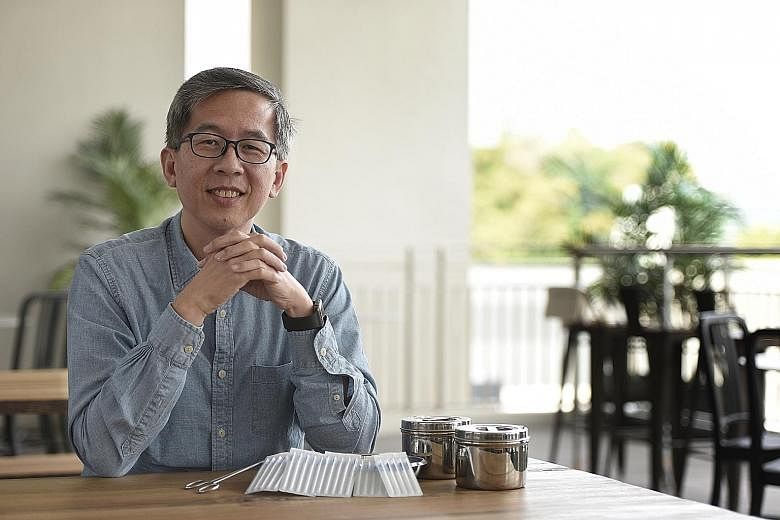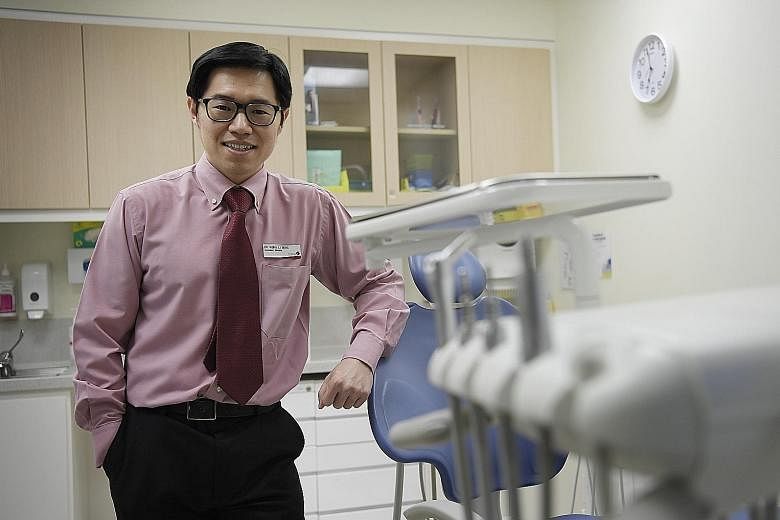It is not just Chinese sinsehs who are well-versed in the ancient healing art of acupuncture.
Doctors and dentists are increasingly taking the certification too - and now make up more than half of the 249 acupuncturists registered in Singapore.
Some medical professionals do this out of personal interest or for teaching and research, while others use it as part of their practice.
One of them is Dr Lau Tang Ching, vice-chairman of medical board (education) at National University Hospital (NUH). The rheumatologist, who was inducted into the register in 2007, said he had read about how acupuncture can ease pain in several conditions, such as neck and back strain, and myofascial pain syndrome.
"I realised the only way to further help patients was to go through the training," added Dr Lau.
The growing interest comes as traditional Chinese medicine (TCM) practitioners crossed the 3,000 mark here, based on latest figures provided by the Health Ministry - a roughly 20 per cent rise from 2010.
There were 2,808 TCM physicians on the register as of end-2015. Somedo acupuncture. Another 249 are registered only as acupuncturists. Among them are 134 doctors and dentists- 54 per cent of the group.
It is a sign of how, in recent years, the TCM sector has made inroads in the mainstream healthcare scene.
Today, four public general hospitals provide needle acupuncture treatment, subject to a doctor's referral, said a ministry spokesman. They are National University, Singapore General, Tan Tock Seng and Khoo Teck Puat hospitals.
"TCM continues to play a complementary role in meeting the healthcare needs of our population," said the spokesman.
One avenue that doctors and dentists can take to obtain acupuncture qualifications is to enrol in a course at the Singapore College of TCM.
Started in 2006, the graduate diploma in acupuncture comprises at least 400 hours of classes, taught in English, over a two-year period.
Currently, there are 12 medical professionals enrolled in the course, said a college spokesman.
After completing the course, they have to pass the school's exam to be eligible for the Singapore Acupuncturists Registration Examination.
It is only when they pass this biennial exam, conducted by the TCM Practitioners Board, that they are licensed to practise acupuncture. Thereafter, one has to renew his licence every one or two years.
Dr Lau, 50, does not perform acupuncture on patients, but the TCM approach he learnt comes in handy in his daily medical work.
"Sometimes, I use the principles in communicating with patients, especially those who are inclined to TCM, to explain how their health can be improved with exercise, dietary adjustment and better emotional well-being," said Dr Lau.
He also works with peers at the National University of Singapore to enhance the teaching of TCM-related topics to medical students. An example is potential interactions between drugs and herbs.
Dentist Wong Li Beng, an accredited acupuncturist since 2011, said an awareness of TCM can lend an extra edge in delivering better care. This is because many people here continue to seek TCM treatment, he noted.
If a dentist knows a patient is taking Chinese herbs that promote blood flow, he can be more careful and carry out steps to stop bleeding, such as suturing the wound site after a dental extraction.
"Knowing a bit of TCM is better than being ignorant and eliminating it totally," added the 37-year-old periodontist at Ng Teng Fong General Hospital.
In dentistry, acupuncture can aid in relieving jaw pain, promoting saliva flow to combat dry mouth, and calming anxious patients.
Dr Wong currently does not practise dental acupuncture at the hospital, though there are plans to roll out the service in the future.
"At the end of the day, we want to find the best way to treat a patient, be it using Western or Chinese medicine."


